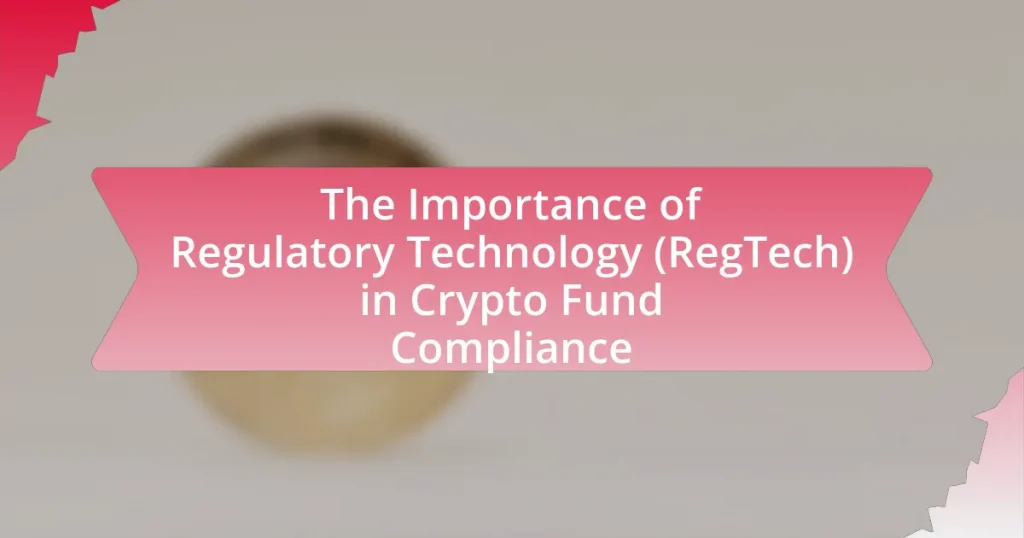Regulatory Technology (RegTech) plays a crucial role in ensuring compliance for cryptocurrency funds by utilizing advanced technology to streamline regulatory processes such as anti-money laundering (AML) checks and know your customer (KYC) procedures. The article outlines how RegTech enhances compliance through automation, real-time transaction monitoring, and improved data analytics, addressing specific challenges faced by crypto funds in a rapidly evolving regulatory landscape. It also discusses the importance of adapting to regulatory changes, the key features of RegTech solutions, and the future trends influenced by artificial intelligence and blockchain technology. Additionally, the article highlights the obstacles crypto funds encounter when implementing RegTech and offers practical steps for effective integration to enhance compliance efforts.
-in-Crypto-Fund-Compliance-1.webp)
What is Regulatory Technology (RegTech) in Crypto Fund Compliance?
Regulatory Technology (RegTech) in Crypto Fund Compliance refers to the use of technology to help cryptocurrency funds comply with regulatory requirements efficiently and effectively. RegTech solutions streamline processes such as anti-money laundering (AML) checks, know your customer (KYC) procedures, and transaction monitoring, thereby reducing the risk of non-compliance. The global RegTech market is projected to grow significantly, with a report from MarketsandMarkets estimating it will reach $55.27 billion by 2025, highlighting the increasing reliance on technology for regulatory adherence in the financial sector, including cryptocurrencies.
How does RegTech enhance compliance in crypto funds?
RegTech enhances compliance in crypto funds by automating regulatory processes and improving data management. This technology streamlines compliance tasks such as transaction monitoring, risk assessment, and reporting, which are critical in the highly regulated environment of cryptocurrency. For instance, RegTech solutions utilize advanced algorithms and machine learning to analyze vast amounts of transaction data in real-time, enabling crypto funds to detect suspicious activities and ensure adherence to Anti-Money Laundering (AML) and Know Your Customer (KYC) regulations. According to a report by the Financial Action Task Force (FATF), effective use of RegTech can significantly reduce compliance costs and improve accuracy in regulatory reporting, thereby enhancing overall compliance in the crypto sector.
What specific compliance challenges do crypto funds face?
Crypto funds face several specific compliance challenges, including regulatory uncertainty, anti-money laundering (AML) requirements, and know your customer (KYC) obligations. Regulatory uncertainty arises from the rapidly evolving legal landscape surrounding cryptocurrencies, which can lead to inconsistent compliance requirements across jurisdictions. AML requirements necessitate robust monitoring systems to detect and report suspicious activities, while KYC obligations require thorough verification of client identities to prevent fraud and ensure compliance with financial regulations. According to a report by the Financial Action Task Force (FATF), 98% of countries have implemented AML measures, highlighting the widespread necessity for crypto funds to adapt to these stringent compliance frameworks.
How does RegTech address these compliance challenges?
RegTech addresses compliance challenges by automating regulatory processes and enhancing data management. This technology streamlines compliance tasks such as monitoring transactions, reporting, and risk assessment, which reduces the burden on financial institutions. For instance, RegTech solutions utilize advanced analytics and machine learning to identify suspicious activities in real-time, thereby improving the accuracy of compliance efforts. According to a report by the World Economic Forum, RegTech can reduce compliance costs by up to 30%, demonstrating its effectiveness in tackling regulatory challenges in the crypto fund sector.
Why is RegTech crucial for the future of crypto fund compliance?
RegTech is crucial for the future of crypto fund compliance because it enhances efficiency and accuracy in regulatory processes. As the cryptocurrency market evolves, regulatory requirements become increasingly complex, necessitating advanced technological solutions to ensure compliance. RegTech solutions utilize automation, machine learning, and data analytics to streamline compliance tasks, reduce human error, and provide real-time monitoring of transactions. For instance, a report by the World Economic Forum highlights that RegTech can significantly lower compliance costs and improve the speed of regulatory reporting, which is essential for crypto funds operating in a rapidly changing environment.
What regulatory changes are impacting crypto funds?
Regulatory changes impacting crypto funds include the implementation of stricter anti-money laundering (AML) and know-your-customer (KYC) requirements, as mandated by jurisdictions such as the European Union’s Markets in Crypto-Assets (MiCA) regulation and the Financial Action Task Force (FATF) guidelines. These regulations require crypto funds to enhance their compliance frameworks, ensuring that they conduct thorough due diligence on investors and monitor transactions for suspicious activity. For instance, the MiCA regulation, set to be fully enforced by 2024, aims to create a comprehensive regulatory framework for digital assets, which will significantly affect how crypto funds operate within the EU.
How does RegTech adapt to evolving regulations?
RegTech adapts to evolving regulations by utilizing advanced technologies such as artificial intelligence, machine learning, and big data analytics to monitor compliance in real-time. These technologies enable RegTech solutions to quickly analyze regulatory changes and assess their impact on existing compliance frameworks. For instance, RegTech platforms can automatically update compliance protocols in response to new regulations, ensuring that organizations remain compliant without manual intervention. This adaptability is crucial in the fast-paced environment of cryptocurrency, where regulations frequently change. According to a report by the Financial Stability Board, the integration of technology in compliance processes can reduce the time and cost associated with regulatory compliance by up to 30%.

What are the key features of RegTech in crypto fund compliance?
The key features of RegTech in crypto fund compliance include automated regulatory reporting, real-time transaction monitoring, and enhanced data analytics capabilities. Automated regulatory reporting streamlines compliance processes by generating necessary reports efficiently, reducing the risk of human error. Real-time transaction monitoring allows for immediate detection of suspicious activities, ensuring adherence to anti-money laundering (AML) and know your customer (KYC) regulations. Enhanced data analytics capabilities enable firms to analyze large volumes of data quickly, facilitating better risk assessment and compliance decision-making. These features collectively improve operational efficiency and regulatory adherence in the rapidly evolving crypto landscape.
How do automation and data analytics play a role in RegTech?
Automation and data analytics are crucial in RegTech as they enhance compliance efficiency and accuracy. Automation streamlines regulatory processes by reducing manual intervention, which minimizes human error and accelerates reporting timelines. For instance, automated systems can continuously monitor transactions for compliance with regulations, enabling real-time alerts for suspicious activities. Data analytics, on the other hand, allows firms to analyze large volumes of data to identify trends, assess risks, and ensure adherence to regulatory requirements. According to a report by Deloitte, 80% of financial institutions believe that data analytics significantly improves their compliance capabilities. Together, these technologies enable organizations to adapt swiftly to regulatory changes while maintaining robust compliance frameworks.
What types of data analytics are most beneficial for compliance?
Descriptive analytics, predictive analytics, and prescriptive analytics are the types of data analytics most beneficial for compliance. Descriptive analytics helps organizations understand historical compliance data, enabling them to identify trends and patterns that may indicate compliance risks. Predictive analytics uses historical data to forecast potential compliance issues, allowing organizations to proactively address risks before they escalate. Prescriptive analytics provides actionable recommendations based on data analysis, guiding organizations in making informed decisions to enhance compliance strategies. These analytics types collectively support organizations in adhering to regulatory requirements and mitigating risks effectively.
How does automation streamline compliance processes?
Automation streamlines compliance processes by reducing manual intervention, thereby increasing efficiency and accuracy. By implementing automated systems, organizations can consistently monitor transactions, generate reports, and ensure adherence to regulatory requirements without the risk of human error. For instance, a study by Deloitte found that automation can reduce compliance costs by up to 30% while improving the speed of compliance reporting. This efficiency allows firms to allocate resources more effectively, focusing on strategic initiatives rather than repetitive compliance tasks.
What role does risk management play in RegTech solutions?
Risk management is integral to RegTech solutions as it enables organizations to identify, assess, and mitigate compliance risks effectively. By leveraging advanced technologies such as artificial intelligence and machine learning, RegTech solutions provide real-time monitoring and analysis of regulatory requirements, ensuring that firms can adapt swiftly to changing regulations. For instance, a study by the Cambridge Centre for Alternative Finance highlights that RegTech can reduce compliance costs by up to 30%, demonstrating its effectiveness in managing financial and operational risks associated with regulatory compliance.
How can RegTech identify and mitigate risks in crypto funds?
RegTech can identify and mitigate risks in crypto funds by utilizing advanced data analytics, machine learning algorithms, and real-time monitoring systems. These technologies enable RegTech solutions to analyze vast amounts of transaction data to detect anomalies, assess compliance with regulations, and identify potential fraud or money laundering activities. For instance, a study by the Cambridge Centre for Alternative Finance found that RegTech tools can reduce compliance costs by up to 30% while enhancing risk management capabilities. By automating compliance processes and providing actionable insights, RegTech effectively minimizes operational risks and ensures adherence to regulatory standards in the rapidly evolving crypto landscape.
What tools are available for effective risk management in RegTech?
Effective risk management in RegTech utilizes tools such as automated compliance monitoring systems, risk assessment software, and data analytics platforms. Automated compliance monitoring systems enable real-time tracking of regulatory changes and compliance status, ensuring organizations remain compliant with evolving regulations. Risk assessment software assists in identifying, analyzing, and mitigating potential risks by evaluating various factors, including market volatility and operational risks. Data analytics platforms provide insights through the analysis of large datasets, helping organizations to detect anomalies and predict potential compliance issues. These tools collectively enhance the ability of organizations to manage risks effectively in the rapidly changing regulatory landscape of the crypto fund sector.

What are the challenges and limitations of RegTech in crypto fund compliance?
The challenges and limitations of RegTech in crypto fund compliance include regulatory uncertainty, technological integration issues, and data privacy concerns. Regulatory uncertainty arises because the crypto landscape is rapidly evolving, leading to inconsistent regulations across jurisdictions, which complicates compliance efforts. Technological integration issues occur as existing systems may not seamlessly incorporate RegTech solutions, resulting in operational inefficiencies. Data privacy concerns are heightened in the crypto space due to the sensitive nature of financial data and varying global standards for data protection, which can hinder the implementation of effective compliance measures. These factors collectively impede the effectiveness of RegTech in ensuring compliance for crypto funds.
What obstacles do crypto funds face when implementing RegTech?
Crypto funds face several obstacles when implementing RegTech, primarily due to regulatory uncertainty, technological integration challenges, and high compliance costs. Regulatory uncertainty arises from the rapidly evolving legal landscape surrounding cryptocurrencies, which complicates the development of effective compliance strategies. Technological integration challenges occur as crypto funds often utilize diverse systems and platforms, making it difficult to implement cohesive RegTech solutions. High compliance costs can deter smaller funds from adopting RegTech, as they may lack the resources to invest in sophisticated compliance technologies. These factors collectively hinder the effective implementation of RegTech in the crypto fund sector.
How can the cost of RegTech solutions be a barrier?
The cost of RegTech solutions can be a barrier by limiting access for smaller firms that cannot afford the high initial investment and ongoing expenses associated with these technologies. Many RegTech solutions require significant financial resources for implementation, maintenance, and updates, which can strain the budgets of smaller crypto funds. According to a report by Deloitte, 40% of small to medium-sized enterprises cite cost as a primary obstacle to adopting advanced regulatory technologies. This financial burden can prevent these firms from effectively complying with regulations, ultimately hindering their ability to operate in the competitive crypto market.
What issues arise from the integration of RegTech with existing systems?
The integration of RegTech with existing systems often leads to compatibility issues, data silos, and regulatory misalignment. Compatibility issues arise when legacy systems cannot seamlessly interface with new RegTech solutions, resulting in operational inefficiencies. Data silos occur when information is not shared across platforms, hindering comprehensive compliance monitoring. Regulatory misalignment can happen if the RegTech solutions do not fully align with the specific regulatory requirements of the crypto fund sector, potentially leading to compliance gaps. These challenges underscore the need for careful planning and assessment during the integration process to ensure effective regulatory compliance.
How can crypto funds overcome these challenges?
Crypto funds can overcome compliance challenges by implementing advanced regulatory technology (RegTech) solutions that streamline compliance processes. These technologies enable real-time monitoring of transactions, automated reporting, and enhanced data analytics, which help funds adhere to regulatory requirements efficiently. For instance, a report by Deloitte highlights that RegTech can reduce compliance costs by up to 30% while improving accuracy and speed in reporting. By adopting these solutions, crypto funds can better navigate the complex regulatory landscape and mitigate risks associated with non-compliance.
What best practices should be followed for successful RegTech implementation?
Successful RegTech implementation requires a clear understanding of regulatory requirements and the integration of technology that aligns with those needs. Organizations should conduct a thorough assessment of their compliance landscape to identify specific regulatory challenges and technology solutions that can address them. Additionally, engaging stakeholders across departments ensures that the RegTech solution meets diverse needs and fosters collaboration.
Training staff on the new technology is essential to maximize its effectiveness and ensure compliance processes are followed correctly. Regularly updating the RegTech system to adapt to changing regulations and incorporating feedback from users can enhance its functionality and relevance.
Evidence from industry reports indicates that organizations that prioritize these best practices experience a 30% reduction in compliance costs and a significant decrease in regulatory breaches, demonstrating the effectiveness of a structured approach to RegTech implementation.
How can collaboration with RegTech providers enhance compliance efforts?
Collaboration with RegTech providers enhances compliance efforts by leveraging advanced technology to streamline regulatory processes. RegTech solutions utilize automation, data analytics, and machine learning to improve the accuracy and efficiency of compliance tasks, reducing the risk of human error. For instance, a study by the Cambridge Centre for Alternative Finance found that firms using RegTech reported a 30% reduction in compliance costs and a 50% decrease in the time spent on compliance activities. This demonstrates that integrating RegTech into compliance frameworks not only optimizes resource allocation but also ensures adherence to evolving regulatory requirements in the crypto fund sector.

What are the future trends of RegTech in crypto fund compliance?
Future trends of RegTech in crypto fund compliance include increased automation, enhanced data analytics, and improved regulatory reporting. Automation will streamline compliance processes, reducing manual errors and increasing efficiency. Enhanced data analytics will enable firms to better monitor transactions and identify suspicious activities in real-time, thereby improving risk management. Improved regulatory reporting will facilitate compliance with evolving regulations, ensuring that crypto funds can adapt quickly to changes in the regulatory landscape. These trends are supported by the growing adoption of artificial intelligence and machine learning technologies, which are being integrated into RegTech solutions to provide more accurate and timely compliance insights.
How is artificial intelligence shaping the future of RegTech?
Artificial intelligence is significantly shaping the future of RegTech by enhancing compliance processes through automation, data analysis, and risk management. AI technologies enable RegTech solutions to analyze vast amounts of regulatory data quickly, identify patterns, and predict compliance risks, which improves the efficiency and accuracy of regulatory reporting. For instance, a report by Deloitte highlights that AI can reduce compliance costs by up to 30% by automating routine tasks and providing real-time insights into regulatory changes. This capability allows organizations to adapt swiftly to evolving regulations, ensuring better compliance in the rapidly changing landscape of crypto fund management.
What advancements in AI are most relevant to compliance?
Advancements in AI that are most relevant to compliance include natural language processing (NLP), machine learning algorithms, and predictive analytics. NLP enables the automated analysis of regulatory texts and compliance documents, allowing organizations to quickly identify relevant regulations and requirements. Machine learning algorithms enhance the ability to detect anomalies and potential compliance breaches by analyzing large datasets for patterns indicative of non-compliance. Predictive analytics further supports compliance efforts by forecasting potential risks and compliance issues based on historical data trends. These advancements collectively improve efficiency, accuracy, and responsiveness in compliance management, as evidenced by the increasing adoption of AI-driven RegTech solutions in the financial sector.
How can AI improve the accuracy of compliance reporting?
AI can improve the accuracy of compliance reporting by automating data collection and analysis, thereby reducing human error. By utilizing machine learning algorithms, AI can analyze vast amounts of data in real-time, identifying discrepancies and ensuring that reports are generated based on accurate and up-to-date information. For instance, a study by Deloitte found that organizations using AI for compliance reporting experienced a 30% reduction in reporting errors, highlighting the technology’s effectiveness in enhancing accuracy.
What emerging technologies are influencing RegTech?
Emerging technologies influencing RegTech include artificial intelligence (AI), blockchain, and big data analytics. AI enhances compliance processes through automation and predictive analytics, enabling firms to identify risks and anomalies more efficiently. Blockchain provides a secure and transparent framework for transactions, facilitating real-time monitoring and reporting, which is crucial for regulatory compliance. Big data analytics allows organizations to process vast amounts of data to derive insights and ensure adherence to regulations. These technologies collectively improve the accuracy, speed, and cost-effectiveness of compliance efforts in the financial sector.
How does blockchain technology integrate with RegTech solutions?
Blockchain technology integrates with RegTech solutions by providing a decentralized and immutable ledger that enhances transparency and traceability in regulatory compliance processes. This integration allows RegTech solutions to automate compliance tasks, such as transaction monitoring and reporting, by leveraging smart contracts that execute predefined rules without human intervention. For instance, blockchain’s ability to record every transaction in real-time ensures that regulatory bodies can access accurate and up-to-date information, reducing the risk of fraud and non-compliance. Additionally, studies have shown that using blockchain can significantly lower compliance costs and improve efficiency, as evidenced by a report from the World Economic Forum, which highlights that blockchain can streamline regulatory reporting and reduce the burden on financial institutions.
What role does machine learning play in enhancing compliance processes?
Machine learning significantly enhances compliance processes by automating data analysis and identifying patterns indicative of non-compliance. This technology enables organizations to process vast amounts of regulatory data quickly, improving the accuracy of compliance monitoring. For instance, machine learning algorithms can analyze transaction data in real-time to detect anomalies that may suggest fraudulent activity or regulatory breaches, thereby reducing the risk of penalties. According to a report by Deloitte, firms utilizing machine learning in compliance have seen a 30% reduction in false positives in fraud detection, demonstrating its effectiveness in streamlining compliance efforts.
What practical steps can crypto funds take to leverage RegTech effectively?
Crypto funds can leverage RegTech effectively by implementing automated compliance solutions that streamline regulatory reporting and monitoring processes. These solutions can include transaction monitoring systems that utilize machine learning algorithms to detect suspicious activities in real-time, thereby enhancing the fund’s ability to comply with Anti-Money Laundering (AML) and Know Your Customer (KYC) regulations. Additionally, crypto funds should integrate RegTech platforms that provide comprehensive data analytics to assess compliance risks and ensure adherence to evolving regulations. According to a report by Deloitte, firms that adopt RegTech solutions can reduce compliance costs by up to 30%, demonstrating the financial and operational benefits of such technologies.















